Latest mobile phone killer app: tracking kids
Jun 13, 2006 — by LinuxDevices Staff — from the LinuxDevices Archive — views Verizon Wireless on July 12 became the latest mobile operator to launch a cellphone-based child-tracking service. With nearly half of teens owning mobile phones (PDF survey), operators hope parents' concerns regarding their… children's whereabouts will make GPS services popular and lucrative.
Verizon Wireless on July 12 became the latest mobile operator to launch a cellphone-based child-tracking service. With nearly half of teens owning mobile phones (PDF survey), operators hope parents' concerns regarding their… children's whereabouts will make GPS services popular and lucrative.
Verizon's announcement this week of its “Chaperone” service follows last month's launch by Sprint-Nextel of a similar service called “Sprint Family Locator.” Additionally, Disney Mobile has indicated that it, too, will be rolling out a family phone service with child-tracking features.
Market analyst ABI Research believes that despite current limitations in infrastructure and technology, attaching child-tracking capabilities to the all-pervasive mobile phone could increase the visibility of location-based services. “By combining tracking and cellular technologies, wireless carriers could jumpstart what has been, to date, a sluggish segment of the GPS market,” notes ABI principal analyst Ken Hyers. “Although network-assisted GPS (A-GPS) handsets will enhance the accuracy and reliability of GPS, vendors will need to set realistic expectations for their customers. In many cases, this will mean educating the public on the real-world availability and accuracy of cellular A-GPS.”
Verizon's basic $9.99 plan uses A-GPS to show a parent the child's phone location on a map on their own phone or PC. The more expensive Child Zone plan at $19.99 allows parents to set virtual zones (“geofences”) for the child based on time of day and day of week. When the child's phone leaves the zone, an alert is sent to the parent's phone. Because of the sensitivity of such a service, Verizon Wireless is taking a number of steps to ensure that only parents can track their children's phones and that others will not be able to misuse the service.
According to a report by Reuters, Verizon's Chaperone service is initially just for parents with children using the Migo phone from LG, a four-button phone designed especially for children that Verizon started selling the Migo in November. Parents can access the service using about 10 different phone models sold by Verizon Wireless including several phones from LG and some phones from Motorola.
The Sprint Family Locator, priced at $9.99, was introduced by Sprint on April 13, with downloads available on 17 phone models. It can be used to locate 30 GPS-enabled phone models, according to Sprint.
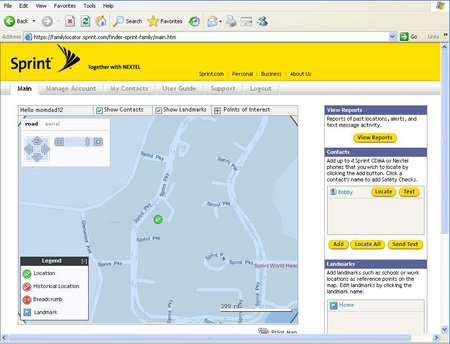
Sprint Family Locator PC screen
(Click image to enlarge)
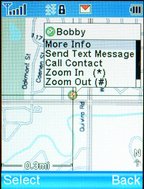
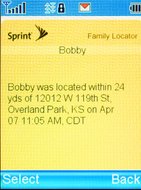
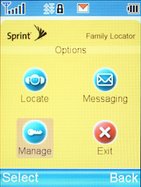
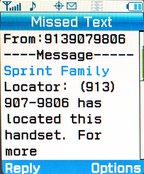
Sprint Family Locator mobile phone screenshots
(Click each image to enlarge)
 A child-tracking GPS service was among the touted features of the Windows CE powered Gizmondo multifunction gaming device, announced in 2003 and subsequently introduced in Europe and the U.S. over the past two years. Gizmondo's tracking service, like those of Verizon and Sprint, was said to allow parents to view the location of their kids (or, at least, of their kids' Gizmondos) on the Internet, and to establish geofences which, when entered, would result in email or SMS message nofications. Gizmondo, however, now appears to be deceased.
A child-tracking GPS service was among the touted features of the Windows CE powered Gizmondo multifunction gaming device, announced in 2003 and subsequently introduced in Europe and the U.S. over the past two years. Gizmondo's tracking service, like those of Verizon and Sprint, was said to allow parents to view the location of their kids (or, at least, of their kids' Gizmondos) on the Internet, and to establish geofences which, when entered, would result in email or SMS message nofications. Gizmondo, however, now appears to be deceased.
Meanwhile, Linux has been used in lots of commercial tracking systems that use cellular mobile networking technology. Examples include vehicle tracking systems from Homeland Integrated Security Systems, Securtex, Parvus, Astrata, National Scientific Corporation, and others. Additionally, the open source eCos OS was used in a Personal Securer panic button device.
Operators are counting on the these new child-tracking services to gain more traction because they are based on mobile phones, which are already being carried by kids in large numbers.
This article was originally published on LinuxDevices.com and has been donated to the open source community by QuinStreet Inc. Please visit LinuxToday.com for up-to-date news and articles about Linux and open source.